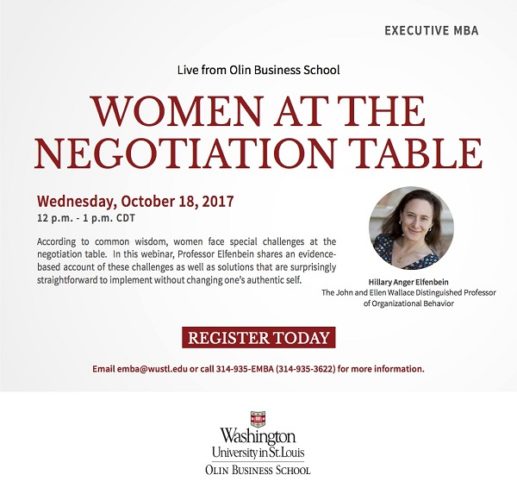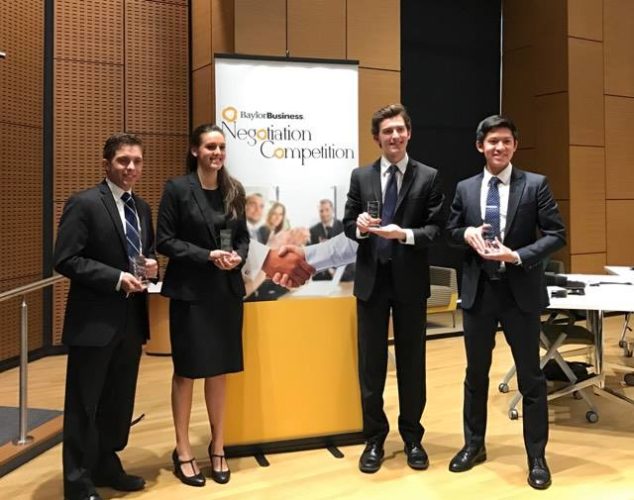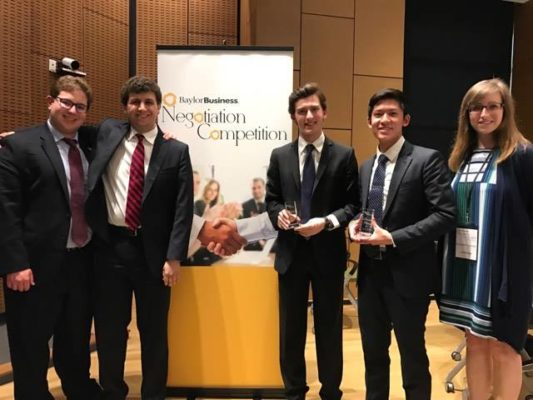Which “Star Wars” character would you bring to a car dealership?

Was it right for Han to shoot first in the cantina scene of “Star Wars Episode IV: A New Hope”?
Did it make sense for Darth Vader to keep changing the terms of his deal with Lando in “The Empire Strikes Back”?
Such were the pressing questions Hillary Anger Elfenbein fielded during a 2022 Dragon Con virtual panel called “Conflict Experts Fight About Star Wars.”

“Let me emphasize that all of this is actually true, in case you think I’m joking,” said Elfenbein, John K. Wallace, Jr. and Ellen A. Wallace Distinguished Professor and professor of organizational behavior at Olin Business School. Her areas of expertise are negotiation, leadership and women in leadership.
Elfenbein was on the Dragon Con panel because she’s one of the authors who contributed to the new book Star Wars and Conflict Resolution: There Are Alternatives to Fighting (December 2022, DRI Press, $15). She and William Bottom wrote the chapter “This Deal’s Getting Worse All the Time: Negotiation Satisfaction Matters.”
Bottom is associate dean and academic director for Undergraduate Programs and the Howard and Marilyn Wood Distinguished Professor at Olin.
‘The Empire Strikes Back’

In the chapter, “we use the storyline of ‘The Empire Strikes Back’ to illustrate rigorous academic principles based on our own research,” Elfenbein says.
They describe the deal that Lando reached with Darth Vader, how it fell apart and what Lando’s experience says about negotiator satisfaction and deal implementation in and outside the “Star Wars”universe.
“The Empire Strikes Back” doesn’t reveal the exact bargaining process and terms Lando and Darth Vader reach. But “we can infer that Vader deploys some of his typical high-pressure tactics to get what he wants,” and, Elfenbein and Bottom write, “likely promises to ignore the illegal gas mining operation on Cloud City if Lando welcomes Han and Leia so that Vader can use them as bait to attract Luke Skywalker.”
The mine is too small for the Empire to care about, but its operation outside the law makes Lando vulnerable to government scrutiny. Vader uses that fact to pressure Lando to agree.
Lying from the outset
“Vader appears to have been lying to Lando from the outset. He claims Han and Leia will go free once Luke arrives, but in truth has already contracted with the bounty hunter to deliver Lando’s old frenemy to Jabba the Hutt.”
The change marks the transition to a second phase in dealing with Lando. “Once Han and Leia arrive, Vader reneges on his word again, creating a third phase of the deal terms in which he insists Leia and Chewbacca remain under Lando’s supervision in Cloud City, never to leave.”
Integrity matters—in the Star Wars universe and in this one. Vader’s willingness to cut a deal and then renege on it over and over again eventually proved to be his undoing.
William Bottom
That change pushes Lando to the brink. Han is frozen in carbonite and carried away, and Vader demands that Lando take Leia and Chewbacca to his Imperial ship. “With this last change marking a fourth phase of the deal, Lando can no longer abide by it. He battles stormtroopers, escapes with Leia and Chewbacca on the Millennium Falcon, and joins up with the rebellion against the Empire.”
Vader’s continued push to win the most favorable terms for himself backfires and contributes to his demise.
Feelings of satisfaction
Among the lessons, according to the authors: Most of us negotiate with something less than overwhelming leverage. We need to build relationships and foster a mutually beneficial exchange to undertake complicated projects. We rely on the assurance that our counterparts will hold up their end of the bargain and accommodate necessary adjustments.
“The mindset and orientation to develop goodwill may flow from the Force but certainly not from the dark side,” they write. We can learn effective listening and rapport-building. Turn-taking and reciprocity can further open communication to reveal opportunities for mutual gain. “In a virtuous cycle, this builds momentum and confidence in the counterpart’s integrity while establishing a foundation for crafting value-creating deal terms. Such deals rely on negotiators’ feelings of satisfaction—which is a lesson Darth Vader learned the hard way.”
“Integrity matters—in the Star Wars universe and in this one,” Bottom said. “Vader’s willingness to cut a deal and then renege on it over and over again eventually proved to be his undoing. Those who can’t control the Force can build a reputation for integrity and trustworthiness that can be its own kind of force.”
Jedi mind tricks
Back to those questions.
Which “Star Wars” character would you bring to a car dealership?
Elfenbein: “Yoda. He has Jedi mind tricks while also being easy to underestimate.”
Was it right for Han to shoot first in the cantina scene of “Star Wars Episode IV: A New Hope”?
“Yes. Based on economic game theory, you are supposed to compete in a one-shot game.”
Did it make sense for Darth Vader to keep changing the terms of his deal with Lando in “The Empire Strikes Back”?
“As Bill and I wrote, yes, the first time. And maybe the second. But definitely not the third.”




 Hillary Anger Elfenbein
Hillary Anger Elfenbein
 Kevin and I then competed in finals in an auditorium for a 45-minute negotiation: our role was a development company negotiating a maintenance contract with a large company. It was a close negotiation and we ended up with a beneficial deal, but lost in a 2-1 decision with the judges. Kevin and I each won $150 for placing 2nd in the competition.
Kevin and I then competed in finals in an auditorium for a 45-minute negotiation: our role was a development company negotiating a maintenance contract with a large company. It was a close negotiation and we ended up with a beneficial deal, but lost in a 2-1 decision with the judges. Kevin and I each won $150 for placing 2nd in the competition.